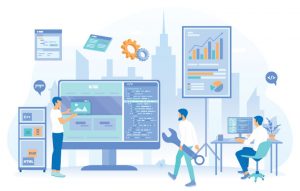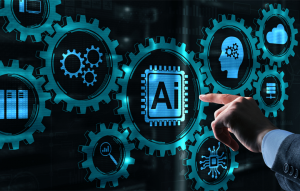In the modern software development landscape, reliance on technology is increasing for efficient and effective software development. The key aspect of software development is software testing, which ensures the applications and systems work as intended. Integration of AI in the software testing process is prevalent and represents a paradigm shift in quality assurance, offering numerous benefits over traditional methods.
In a study titled “Future of Quality Assurance 2023” by LambdaTest, 1,615 software testing professionals from 70 countries illuminate the software testing practices in 2023, including that 78% have already adopted AI.
The importance of AI in testing lies in its ability to streamline processes, reduce human intervention, and contribute to a faster, more reliable software development cycle. Let’s understand AI in test automation and explore the truths about automated software testing.
Understanding AI in test automation
Artificial intelligence (AI) techniques and algorithms enhance and optimize the testing process during the software development lifecycle. The purpose of using AI in software testing is not to automate tedious tasks but;
- Automate repetitive tasks
- Predict and solve complex defects such as code changes, historical defect data, and other relevant factors to understand potential issues and areas of the software.
- Generate adaptive test cases based on requirements, specifications, and historical data.
- Log analysis analyzes log files and other system data to identify patterns and issues.
- Use behavior simulation to imitate user interactions to uncover usability issues, performance bottlenecks, and other problems.
It ensures the improvement of overall software quality and speeds up the testing process. Using various techniques such as machine learning, natural language processing, computer vision, and deep learning helps to make efficient decisions, making them faster, more accurate, and cost-effective. It aims to improve the effectiveness of the testing process and deliver higher-quality software products to end-users.
Suggested: The role of AI and ML in test automation evolution
Now, let’s explore the truth about AI in software test automation.
1. AI in software testing for better software quality
Undoubtedly, AI can enhance software quality, analyze data, and identify patterns. AI-driven testing tools can detect defects, vulnerabilities, and performance that can be challenging with manual testing. By automating repetitive tasks, AI contributes to a robust and reliable software product and delivers software faster.
These innovative tools enable swift execution of test cases by giving quick feedback on code changes. It not only reduces time-to-market but ensures new features do not consist of unforeseen bugs in the existing codebase.
2. Minimal maintenance for visual updates and redesigns with AI testing
The purpose of functional UI is to validate the functionality of an application’s user interface. However, functional UI testing can be challenging for web and mobile applications particularly when the testing framework is dependent on the DOM model. Tests utilizing DOM-based element selectors are prone to failure as UI structure and behavior evolve with updates.
AI with computer vision provides a revolutionary capability to perceive and test the functionalities displayed on the screen. Through image-based analysis, AI can identify elements on an application screen and how it is implemented. This eliminates the necessity for DOM-based analysis, minimizing the need for extensive test script maintenance when UI designs change.
3. One-size-fits-all solution is a myth
The adoption of AI test automation solutions is essential for diverse project success. The need for each software project may vary according to its complexity, technological stacks, and requirements. AI-based testing solutions might work well for one project but may not be suitable for another. Therefore, decision-makers, before opting for the solution, must evaluate their requirements and then leverage AI rather than expecting it as a universal solution.
For AI application testing to be effective, specify your project requirements and customize accordingly. The customization includes training of an artificial intelligence model based on content, adjusting the algorithms for a better understanding of the application’s requirement, and seamlessly integrating with the existing tools and project workflow.
4. Increase test coverage and test speed level with AI
Traditional test automation involves manual test case creation for each new feature and application that may take weeks or months to complete. Also, it might create a high level of risk like functionality failure and UI accessibility. As software complexity is rising faster, performing the testing powered by AI has become necessary to validate the quality of the software product right from the engineering team’s ability to design and test script writing.
5. AI-driven testing will not replace human testers
The introduction of AI in software testing raised a common misconception of replacing human testers and diminishing the value of their expertise. The fear emerged from AI’s ability to automate repetitive tasks, speed up the process, and analyze the vast data sets with unprecedented efficiency.
AI-driven testing tools do not replace testers, but they augment their capabilities. It automates the repetitive tasks and frees them to focus on more intricate work, allowing them to create testing scenarios that demand human intuition, understanding of user behavior, and strategic thinking. Artificial intelligence can execute thousands of test cases and deliver feedback at the same time. It still relies on human testers to interpret results, make strategic decisions, and provide the necessary understanding of complex test scenarios.
AI-powered tools for software testing
- Healenium
Healenium is a software testing platform that utilizes AI and ML algorithms to optimize and automate the testing process. Some of its key benefits are:
- Minimizes maintenance time of test automation code
- Improves CI pipeline stability, reducing the testing stage failures
- Enhances efficiency in your test automation
Suggested: Explore test automation with Healenium
- Report portal
ReportPortal is an open-source, AI-powered test automation reporting platform designed to enhance the visibility and efficiency of software testing processes. Some of its benefits are as follows:
- Automated decision-making
- Real-time analytics
- Test results visualization
- Transparency of test failure reasons
- Tracking key metrics and KPI
- Testrigor
An executable specification engine designed to allow anyone on your team to build, maintain, and understand tests created and executed in plain English.
- Maximize productivity
- Build test automation 50 times faster than its competitors
- Quickly achieve test coverage with minimal maintenance
- Test case generator
It is an in-house AI tool created by an expert QA team of Softweb Solutions. This integrates with project management platforms efficiently. Some of its benefits include:
- Improved quality assurance
- Faster turnaround times
- Reduced manual efforts
- Scalability
Conclusion
Various industries have started using AI in test automation. Companies are leveraging AI technologies to streamline their testing processes, reduce manual efforts, and improve the speed and accuracy of test execution. It enables testers, developers, and software professionals to cope with the challenges that were once thought to be impossible. Do you want to improve your software testing process? Elevate your software quality with our AI-powered QA testing services. Contact our experts for automated testing as a service.









